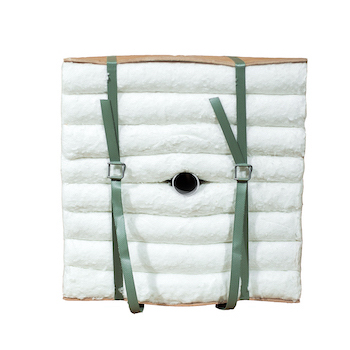
Price: on request
Ceramic fiber module is processed in proprietary machinery from its corresponding needle blankets to its required structure and sizes. In the machining process, keep the certain compression ratio to ensure the refractory modular blocks can be expanded in different directions when it was completed installed in the furnace wall to have the ceramic fiber modules are crowded into a seamless whole. The ceramic fiber modules are fixed to the industrial furnace shell plate directly by various of anchors.
Type:
modular blocks from high-temperature heat-insulating fiber with mechanical fastening.
Product characteristics:
• A flexible fiber blanket can resist the external mechanical force.
• As with light weight, the heat storage is low when used as heat insulation materials.
• Various of anchors which fixed behind of anchors can ensure the module installation easily whether by soldiers raw way or parquet floor way.
• When strapping is throw away, the blankets can be pushed in one in the compression direction, its flexibility can make up the deformation of the furnace shell and make no gaps exist between the modules.
• Low thermal conductivity can result to higher effect on energy saving and thermal shock resistance.
• The lining body can be put into use once well installation with no drying and curing.
• Anchor system is far from hot face to keep the metal anchor at relatively low temperature.
Typical application:
• Furnace lining of all kinds of industrial furnace and heating devices in metallurgy, machinery, building materials, petrol-chemical and nonferrous metal.
Standard sizes:
• 300х300х200 mm
• 300х300х250 mm
• 300х300х300 mm
Also possible to manufacture modular blocks of other shapes and sizes according to customer requirements.
Main technical characteristics | UOM | IM – 1140 | IM – 1260 | IM – 1427 |
Application temperature: | 0C | 1260 | 1260 | 1427 |
Density | kg/m3 | 160 - 220 | 160 - 220 | 160 - 220 |
Coefficient of thermal conductivity: | W/m*K | 0,11
| 0,11
| 0,11 |
Heat capacity at a temperature 1000 0С | J | 1130 | 1130 | 1130 |
Linear shrinkage: | % | -2,5 | -2,5 | -3,5 |
Chemical composition: | % | 44-47 | 45-49 | 38-40 |

